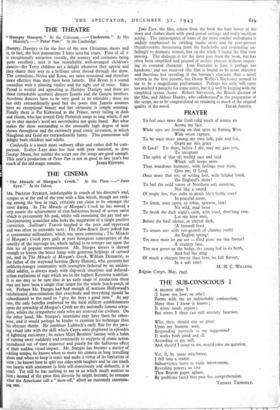THE CINEMA
MR. PRESTON STURGES, indefatigably in search of his director's soul, scrapes in at the end of the year with a film which, though not rank- ing among the best in 1943, certainly can claim to be amongst the most daring. In The Miracle of Morgan's Creek he has moved a step nearer the achievement of that boisterous brand of screen satire which is presumably his goal, whilst still remaining the gay and un- discriminating iconoclast who lacks the inspiration of a single positive conviction. Sullivan's Travels laughed at the poor and oppressed and was often in execrable taste ; The Palm-Beach Story poked fun at sentimental millionaires, which was more promising ; The Miracle of Morgan's Creek jeers gaily at petit bourgeois conceptions of the sanctity of the marriage tie, which indeed is to venture out upon the thin ice of popular entertainment. Mr. Sturges always is shrewd enough to leaven the bitter lump with generous helpings of custard pie, and. in The Miracle of Morgan's Creek, William Demarest, as the father of the wayward heroine (Betty Hutton), who presents her publicity-hungry community with sextuplets fathered by an uniden- tified soldier, is always ready with slap-stick situations and delayed- action explosions of rage which are in the highest Keystone tradition. It is not easy to be sure that at an early stage of production there may not have been a single clear target for the whole hotch-potch of wit. Perhaps Mr. Sturges had had enough of wartime Hollywood's exhibitionist determination that everybody and everything should be subordinated to the need to " give the boys a good time." At any rate, the only benefits conferred by the local military establishments upon the township of Morgan's Creek are the nationally famous sextu- plets, whilst the sympathetic male roles are reserved for civilians. On the other hand, Mr. Sturges's intentions may have been far other- wise, and it would perhaps be kinder to examine his technique than his obscure theme. He combines Lubitsch's early flair for the pass- ing visual joke with the skill which Capra once displayed in episodes of lightning caricature ; he mixes Marx Brothers' fantasy with a habit of cutting away suddenly and irrationally to snippets of comic action introduced out of time sequence and purely for the ludicrous effect of their sudden visual impact. Mr. Sturges has become a master of editing tempo, he knows when to move his camera in long travelling shots and when to keep it static and make a virtue of its limitation of view ; he knows how to split our sides with laughter and he can touch our hearts with sentiment (a little self-consciously and defiantly, it is true). Yet still he has nothing to say to us which much matters to him ; instead of the great film director he might become, he remains what the Americans call a " show-off," albeit an extremely entertain- ing one. lame Eyre, the film, selects from the book the bare bones of the story and clothes them with good period settings and really excellent acting. The extravagance of some of the more sombre melodrama is unduly emphasised by swirling studio mists and by ever-present thunderstorms threatening from the backcloths and responding un- failingly to dramatic stimuli, but on the whole I found the film very moving. The dialogue is for the most part from the book, but has often been simplified and pruned of archaic phrases without impair- ing its essential character. Joan Fontaine as Jane is perhaps too handsome and too reserved (the film is bound to be more objective and therefore less revealing of the heroine's character than a novel written in the first person), but Orson Welles's Rochester seemed to me to be a magnificent performance. Perhaps his style will carry too marked a panache for some tastes, but it is well in keeping with the simplified screen theme. Robert Stevenson, the British director of the film, and Aldous Huxley, who collaborated' in the preparation of the script, are to be congratulated on retaining so much of the original






























 Previous page
Previous page